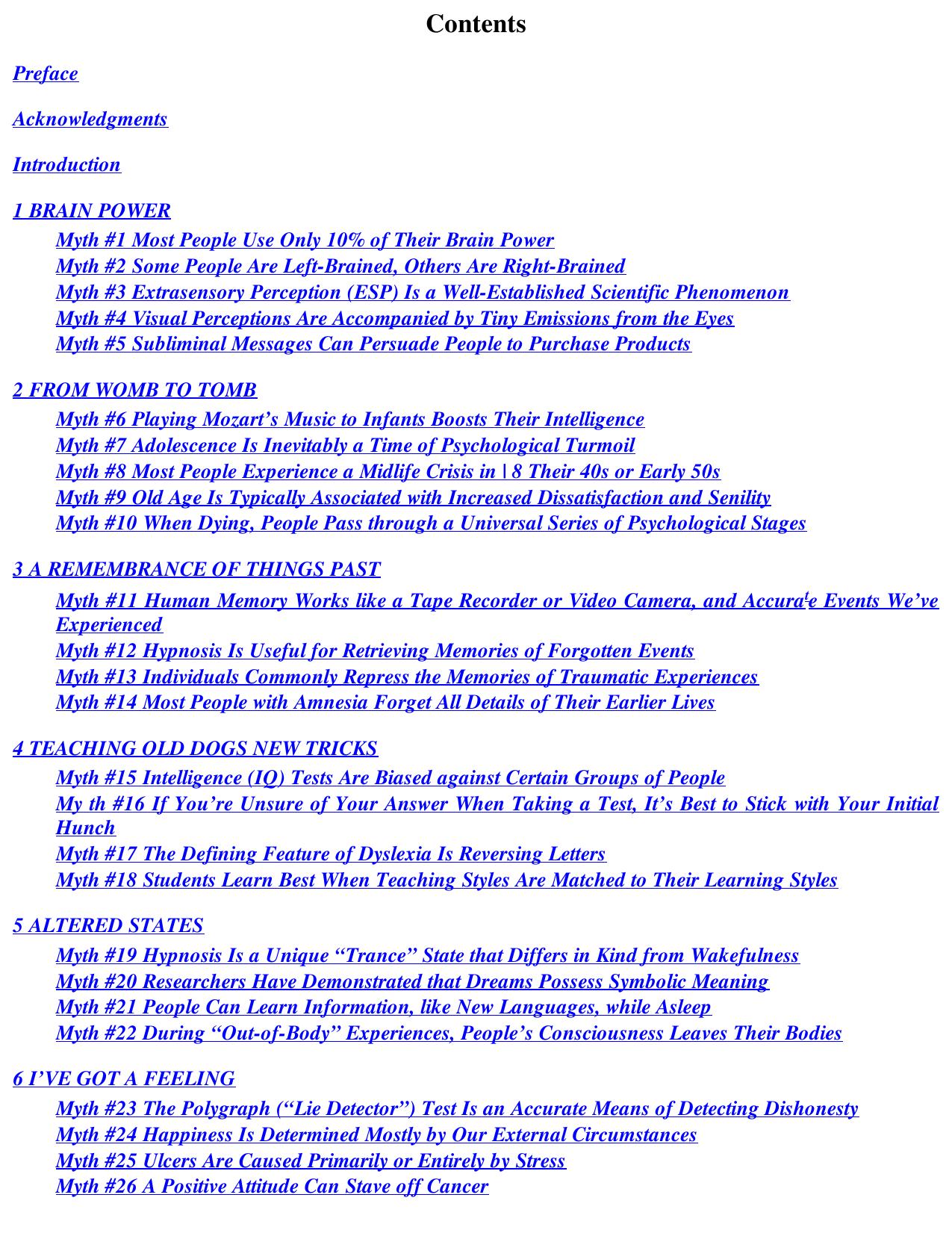50 GREAT MYTHS OF POPULAR PSYCHOLOGY by Scott O. Lilienfeld & Steven Jay Lynn & John Ruscio & Barry L. Beyerstein

Author:Scott O. Lilienfeld & Steven Jay Lynn & John Ruscio & Barry L. Beyerstein [Lilienfeld, Scott O. & Lynn, Steven Jay & Ruscio, John & Beyerstein, Barry L.]
Language: eng
Format: epub, pdf
Publisher: John Wiley & Sons
Published: 2011-09-02T05:00:00+00:00
Myth #33 Low Self-Esteem Is a Major Cause of Psychological Problems
On the morning of April 20, 1999—perhaps not coincidentally, Adolph Hitler’s 110th birthday—two teenage students dressed in black trench coats strolled calmly into Columbine High School in Littleton, Colorado. Although essentially unknown prior to that morning, Eric Harris and Dylan Klebold were to become household names in America by the day’s end. Armed with an assortment of guns and bombs, they gleefully chased down and slaughtered 12 students and a teacher before killing themselves.
No sooner did the Columbine tragedy occur than a parade of mental health experts and social commentators took to the airwaves to specu late on its causes. Although these pundits invoked a host of possible influences, one emerged as the clear front-runner: low self-esteem. The opinions expressed on one website were typical:
The shootings at Columbine and other schools across the country continue the frightening pattern of kids shooting kids … While keeping guns out of the hands of our children is critical, teaching them to value them selves and others is even more important. (www.axelroadlearning.com/teenvaluestudy.htm)
Others have explained the supposed recent epidemic of school shoot ings across America in terms of a marked decline in children’s self-esteem (we say “supposed” because the claim that school shootings have been becoming more common is itself a myth; Cornell, 2006). The handful of mental health professionals who’ve questioned this prevailing wisdom publicly haven’t always been well received. During a 1990s televised talk show, a psychologist patiently attempted to spell out the multiple causes underlying teen violence. One associate producer, believing the psychologist’s arguments to be needlessly complicated, angrily waved a large card at her that read simply “SELF-ESTEEM!” (Colvin, 2000).
Indeed, many popular psychologists have long maintained that low self-esteem is a prime culprit in generating many unhealthy behaviors, including violence, depression, anxiety, and alcoholism. From Norman Vincent Peale’s (1952) classic The Power of Positive Thinking onward, self-help books proclaiming the virtues of self-esteem have become regular fixtures in bookstores. In a bestselling book, The Six Pillars of Self-Esteem, self-esteem guru Nathaniel Branden insisted that one:
cannot think of a single psychological problem—from anxiety and depres sion, to fear of intimacy or of success, to spouse battery or child molestation —that is not traceable to the problem of low self-esteem. (Branden, 1994)
The National Association for Self-Esteem similarly claims that:
A close relationship has been documented between low self-esteem and such problems as violence, alcoholism, drug abuse, eating disorders, school dropouts, teenage pregnancy, suicide, and low academic achievement. (Reasoner, 2000)
The perception that low self-esteem is detrimental to psychological health has exerted an impact on public policy. In 1986, California funded a Task Force on Self-Esteem and Personal and Social Responsibility to the tune of $245,000 per year. Its goal was to examine the negative con sequences of low self-esteem and to find a means of remedying them. The prime mover behind this task force, California state assemblyman John Vasconcellos, argued that enhancing the self-esteem of California’s citizens could help balance the state’s budget (Dawes, 1994).
The self-esteem movement has also found its way into mainstream educational and occupational practices.
Download
50 GREAT MYTHS OF POPULAR PSYCHOLOGY by Scott O. Lilienfeld & Steven Jay Lynn & John Ruscio & Barry L. Beyerstein.pdf
This site does not store any files on its server. We only index and link to content provided by other sites. Please contact the content providers to delete copyright contents if any and email us, we'll remove relevant links or contents immediately.
Periodization Training for Sports by Tudor Bompa(7361)
The MacArthur Bible Commentary by John MacArthur(4261)
The Body: A Guide for Occupants by Bill Bryson(3863)
The Sports Rules Book by Human Kinetics(3616)
What It Really Takes to Get Into Ivy League and Other Highly Selective Colleges by Hughes Chuck(3233)
Marijuana Grower's Handbook by Ed Rosenthal(3143)
The Sprouting Book by Ann Wigmore(3069)
Salt, Fat, Acid, Heat: Mastering the Elements of Good Cooking by Nosrat Samin(2671)
The Martian by Andy Weir(2636)
Classic by Mary Berry(2517)
The Bread Bible by Rose Levy Beranbaum(2491)
Sapiens and Homo Deus by Yuval Noah Harari(2436)
Harry Potter 4 - Harry Potter and The Goblet of Fire by J.K.Rowling(2431)
The Marketing Plan Handbook: Develop Big-Picture Marketing Plans for Pennies on the Dollar by Robert W. Bly(2428)
Martha Stewart's Baking Handbook by Martha Stewart(2347)
Screenplay: The Foundations of Screenwriting by Syd Field(2077)
50 Economics Classics by Tom Butler-Bowdon(2075)
The Plant Paradox by Dr. Steven R. Gundry M.D(2060)
The Cambridge Grammar Of The English Language by Rodney Huddleston Geoffrey K. Pullum(2059)
